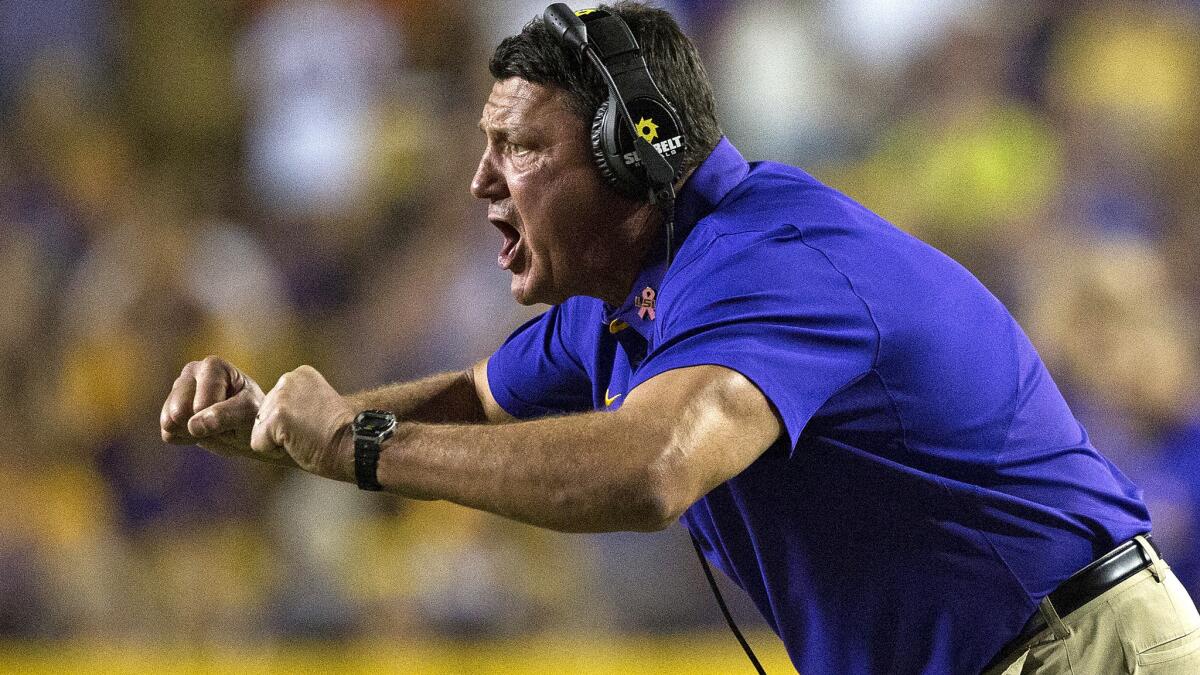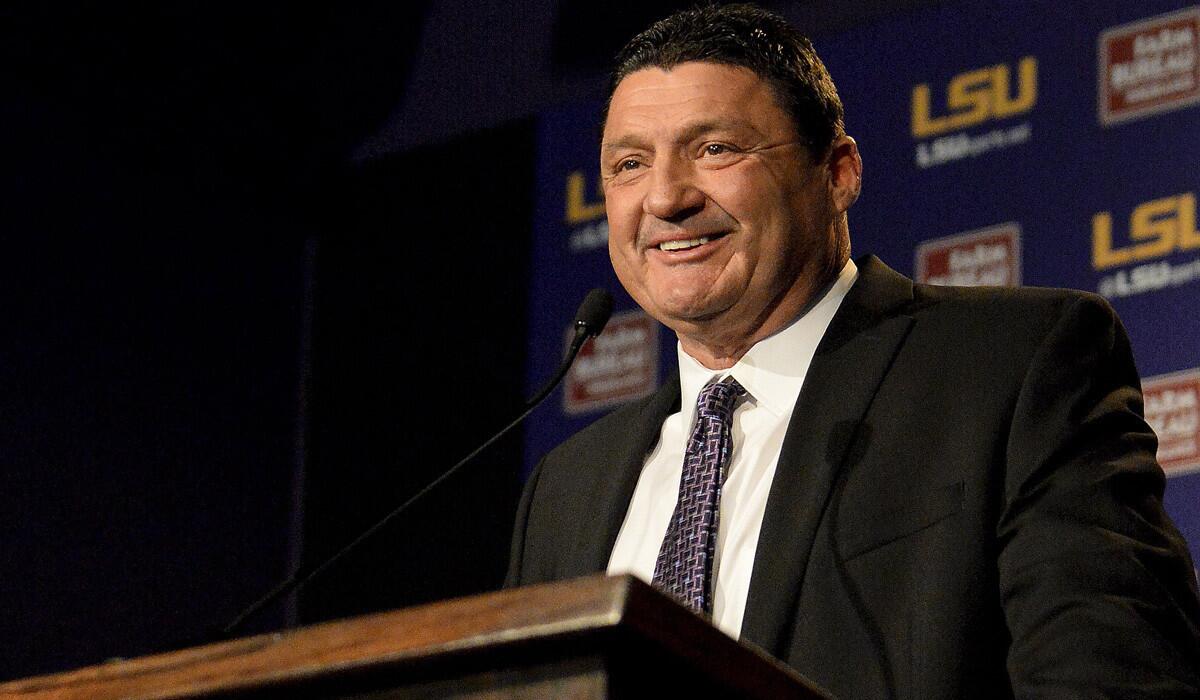Ed Orgeron is back where he wanted to be, coaching LSU

Reporting from Baton Rouge, La. — The stadium begins to fill around sunset, all those fans arriving in purple and gold, fueled by an afternoon of tailgating and a Southern fervor for college football.
Louisiana State officials expect the largest crowd of the season and you can hear it, an excited murmur before kickoff.
Ed Orgeron emerges from the locker room to have a look, walking onto the field while his team is getting ready.
“Whatcha think of this?” he asks.
In an hour or so, Orgeron will make his debut as LSU’s interim coach in a game against Missouri and he can hardly keep still, visiting with recruits, glad-handing alumni along the sideline. When his players jog out, he paces excitedly, hollering and slapping helmets.
This is what the Tigers faithful wanted after Les Miles was fired last week. They knew what Orgeron did as a fill-in at USC three years ago and wanted him to inject the same energy into their team, which had slipped from the Top 25 after two losses.
Also, they knew Orgeron was one of them, a Cajun from Lafourche Parish. Within days of the coaching change, people were paying $25 for “Geaux Coach Oeaux” shirts.
All of which puts a grin on Orgeron’s face as he stands in the end zone before his first game.
“A hometown boy,” he says. “I’m back home.”
::
The Tigers’ football complex sits at the edge of campus, beside the Mississippi River. The coach’s office on the second floor looks bare — there hasn’t been time to add knickknacks or family pictures.
“From the moment I get here in the morning, man, it’s full speed ahead,” Orgeron says. “Lot of work to do.”
If taking charge at midseason feels hectic, it is also familiar.
“Just like at USC,” he says. “Eight games left.”
The memories from 2013 and taking over for Lane Kiffin remain vivid. A string of emotional wins. The losses to Notre Dame and UCLA. Then bitter disappointment when then-athletic director Pat Haden decided to hire Steve Sarkisian.
You know what I realized? How much I missed being with a team. It was the first time in my life I’d been without a team since bitty basketball.
— Ed Orgeron on taking a year off after leaving USC

Plenty has been written about Orgeron leaving town in anger, declining an offer to stick around as an assistant, choosing not to stay with the team through the Las Vegas Bowl.
“It took about three months to get over the USC deal,” he says. “It was like a death or a divorce.”
Back home in Mandeville, an hour east of Baton Rouge, Orgeron went to all of his sons’ practices and games. He took his wife on vacation.
“I needed that year off,” he says. “You know what I realized? How much I missed being with a team. It was the first time in my life I’d been without a team since bitty basketball.”
Orgeron started looking around. His calls to USC went unanswered, so he let certain people know of his interest in coaching at LSU. He had a history with the school.
The Tigers had signed him to a football scholarship out of South Lafourche High in 1979 and brought him to training camp as a freshman lineman. But homesickness soon drove the small-town kid back to the bayou.
His father, in the construction business, put him to work the next day.
“I was digging ditches by the side of the road,” Orgeron says. “People would drive by and yell ‘You quit.’ It was the worst time of my life.”
A former high school teammate — quarterback Bobby Hebert — persuaded Orgeron to join him at Northwestern (La.) State, where they both had successful college careers.
For years afterward, whenever Orgeron drove across the Horace Wilkinson Bridge and saw the LSU campus along the river, he told himself: I’m gonna make it back there someday.
::
The call came in January 2015. The Tigers had an opening.
“Coach Miles said he didn’t need no interview,” Orgeron recalls. “He asked if I could start the next day. … I got in my Hummer and drove.”
At 55, he was still built thick and strong, his voice still full of gravel. But previous coaching stints — a rocky three seasons at Mississippi preceded the USC job — had worn away some of the sharp edges.
There was less “gettin’ on the guys,” as Orgeron puts it. However, his passion for the game endured.
“He’s that way 24-7,” receiver Malachi Dupre says. “Ya’ll could just be eating dinner … he’s always screaming, upbeat.”
His optimism would be tested by difficult circumstances. Miles had fallen out of favor, with fans grousing about a conservative offense and players unhappy with long, grueling practices.
Throughout last season and into this fall, there were constant rumors of a coaching change.
After a last-second loss to Auburn in late September, Orgeron was walking through the coaches’ offices when an assistant athletic director found him and broke the news: “You’re the new head coach.”
It wasn’t a complete surprise; Orgeron knew he was a possible replacement. He met briefly with the staff, then started digging through his computer files.
“All the stuff I needed was in an email,” he says.
Practice schedules and organizational charts. Installation plans for offense and defense. It was the road map he had drawn up for his interim tenure at USC.
The next day, Orgeron put his players through the same team-building exercise — a tug-of-war game — that Pete Carroll had employed when taking over at USC in 2001.
In another nod to that era, Orgeron announced that each day would have a theme: Competition Tuesday, Turnover Wednesday, etc. Practices would be short but intense.
“Monday we had a set of reps where we had to run the play, then sprint 30 yards downfield and back,” fullback J.D. Moore says. “When we went back and watched the film, Coach O was right there sprinting with everybody. You could see him practicing what he preaches.”
His enthusiasm stemmed from experience. And from something else.
“At USC, you were just filling in. Now I’m being treated like the head coach and I can feel that support,” Orgeron says. “Here’s the deal — I’m part of them. I’m family.”
::
LSU football is everywhere you look in Baton Rouge. On billboards and bumper stickers. On ball caps and flags that flap from passing cars.
But, this summer, real life intruded.
Protesters gathered in the streets after police shot a black resident, Alton Sterling, in early July. Two weeks later, an out-of-state man ambushed local cops, killing three of them and injuring three others.
Then, in August, catastrophic floods hit the city, devastating entire neighborhoods. Drive down the streets and you see houses gutted, with piles of ruined lumber and drywall in the front yards.
“On Saturdays, LSU football is king,” says Michael McClanahan, head of the local NAACP chapter. “But when the game is over, we go back to our communities to deal with poverty, crime, lack of education.”
As a native son, Orgeron knows about the world beyond his practice fields and stadium. As a football coach, he wonders what to do.
“Here’s my thought on this, OK?” he says. “The best thing we can do is to get the Tigers to play, get the Tigers to win. Give the people something to feel good about.”
This notion appeals to diehards like Marvin Dugas, known as “Big Ragoo,” one of the team’s best-known fans.
“LSU football is important to our culture,” Dugas says at a tailgate party before the Missouri game. “Also, LSU is about people. Ed being from down on the bayou, well, he’s a kindred spirit.”
::
The Missouri game is more than a debut. It is a raucous celebration, a three-hour party with 102,000 fans roaring and, at one point, holding up their glowing cellphones as if it were a rock concert.
The defense plays aggressively and the offense lines up in spread formations, throwing quick passes that turn into long gains.
“We started the game with four wide,” Dupre says. “We haven’t put four receivers on the field in a long time.”
Many things about the 42-7 win are reminiscent of Carroll’s years at USC. The Tigers amass 634 yards of offense, a school record for a Southeastern Conference game.
“They did a couple of different things,” Missouri Coach Barry Odom says.
In the closing moments, Orgeron’s players douse him with Gatorade. The grin on his face is still there the next morning.
Back at work on a humid Sunday, he fixes a plate of Cajun spaghetti for a visitor and leads the way into the film room, saying: “You’ve gotta see this.”
The screen shows a short-yardage situation from the night before, LSU’s defense exploding off the line, staying low, chopping down the Missouri blockers as a linebacker vaults over the top to make the tackle.
Orgeron hits the replay button over and over, using a laser pointer for emphasis.
“That’s effort,” he says. “These guys have bought in.”
The interim coach knows that people are talking. He knows that, after one week, local media is already speculating on his chances of getting the head job for good.
Given what happened at USC, it raises a question: Is Orgeron setting himself up for another letdown? He shrugs.
“If we don’t win enough games and I don’t get hired, hey, I had the opportunity,” he says. “That’s all a man can ask.”
Then that preternatural hopefulness kicks in. Orgeron cannot help himself. He has to add one more thing.
“This time is different,” he says. “I feel like I’m gonna get a fair shot.”
The kid from Bayou Lafourche hopes he is home to stay.
david.wharton@latimes.com
Twitter: @LATimesWharton
More to Read
Go beyond the scoreboard
Get the latest on L.A.'s teams in the daily Sports Report newsletter.
You may occasionally receive promotional content from the Los Angeles Times.











